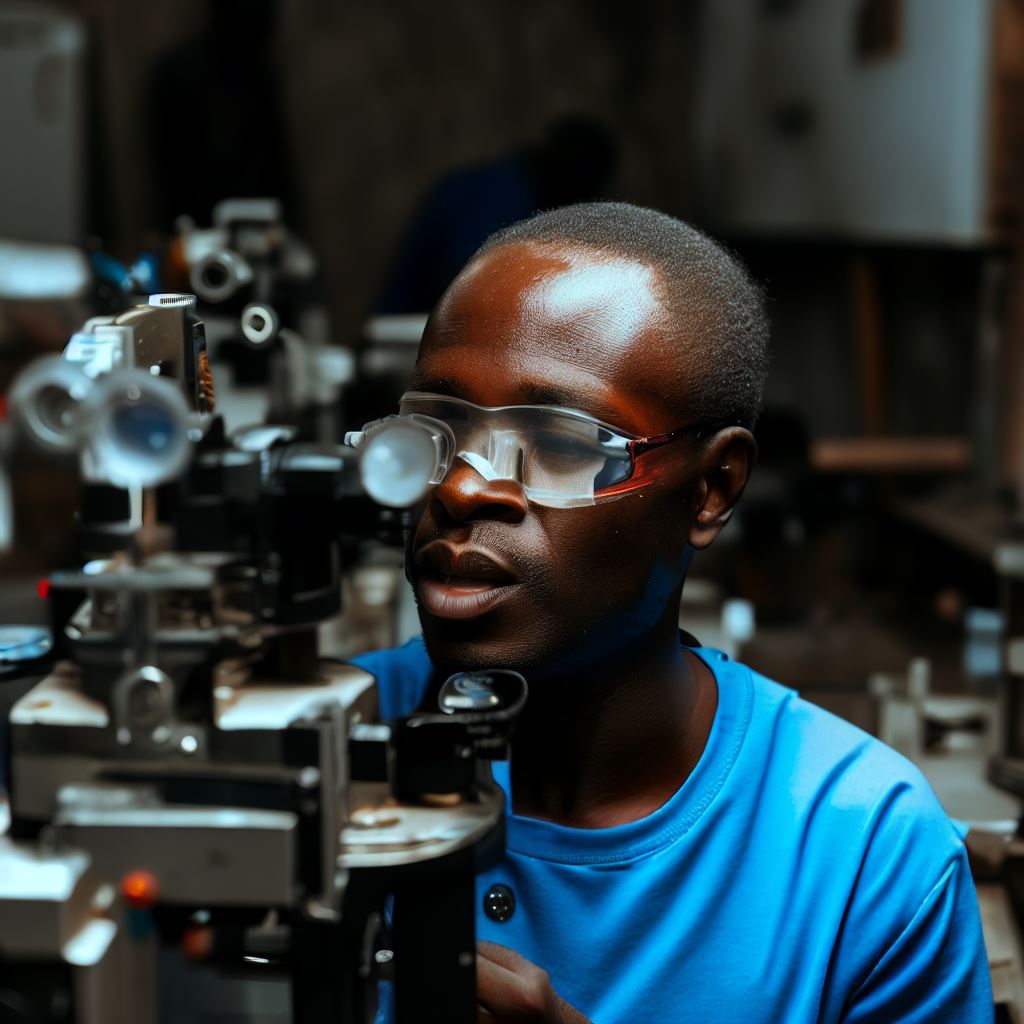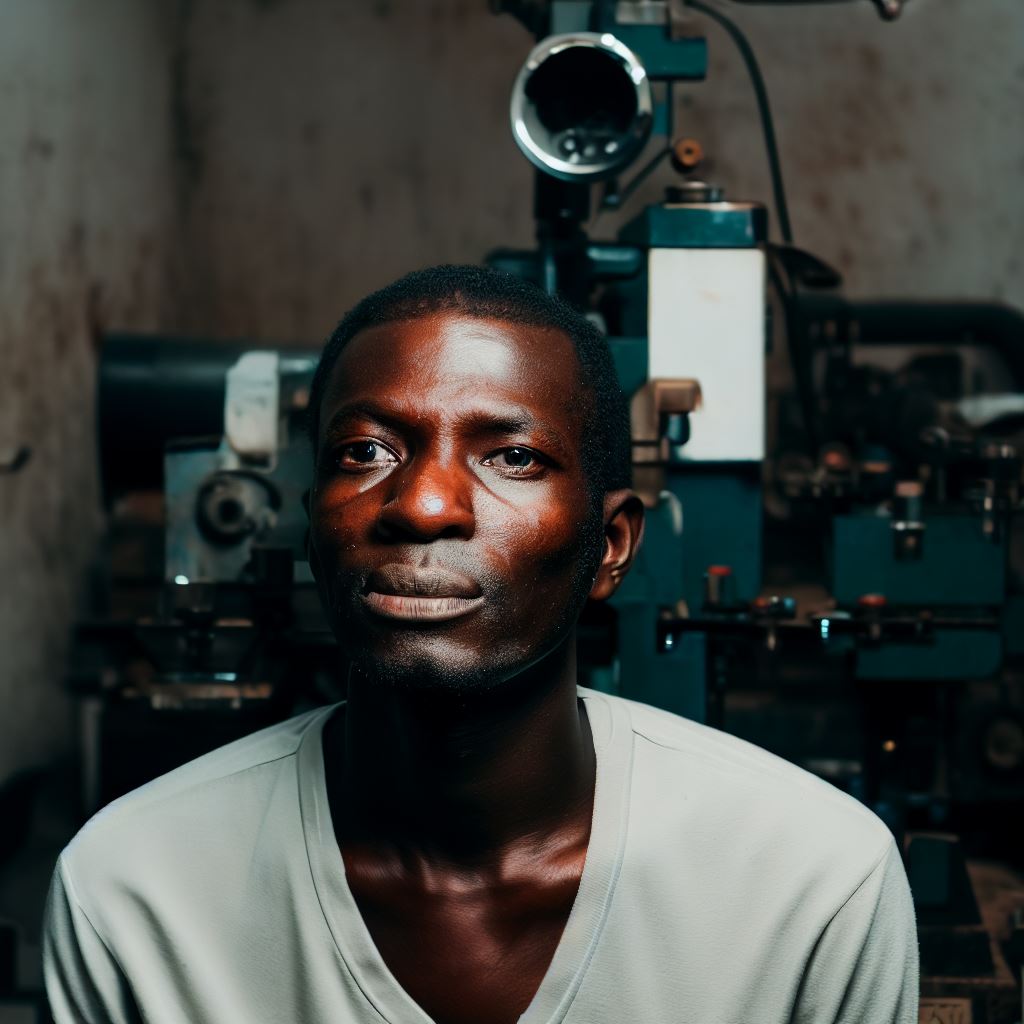Introduction
Optical fabrication equipment plays a vital role in various industries, including telecommunications, manufacturing, and healthcare.
In this blog post, we will explore the importance of optical fabrication equipment and its relevance to the Nigerian market.
Optical fabrication equipment is crucial for the production of precision optical components used in various applications.
These components include lenses, mirrors, prisms, and filters, which are integral parts of devices such as cameras, telescopes, and medical instruments.
The Nigerian market is experiencing rapid growth in sectors like telecommunications and healthcare.
To meet the increasing demand for advanced optical devices, local manufacturers need access to reliable and efficient fabrication equipment.
Investing in optical fabrication equipment can support the development of a local supply chain and reduce import dependency.
By manufacturing optical components domestically, Nigerian companies can contribute to job creation and technology advancement in the country.
Furthermore, having access to quality fabrication equipment enables local manufacturers to produce high-performance optical products at competitive prices.
This not only benefits the Nigerian market but also creates export opportunities, contributing to economic growth.
In fact, optical fabrication equipment plays a crucial role in various industries and has significant relevance to the Nigerian market.
Investing in this equipment will not only boost local manufacturing capabilities but also support economic development and job creation in Nigeria.
Background of Optical Fabrication Equipment in Nigeria
The history and development of optical fabrication equipment in Nigeria have seen significant growth over the years.
As the Nigerian optical industry continues to expand, the need for advanced tools and equipment becomes crucial for the industry’s success.
In the past, Nigeria relied heavily on imported optical fabrication equipment to meet its industry’s needs.
However, with technological advancements and increased local demand, the country has made efforts to establish its own manufacturing facilities.
This development has been driven by the government’s initiatives to promote indigenization and reduce its dependence on foreign imports.
The establishment of local manufacturing facilities has allowed Nigeria to produce its own optical fabrication equipment, thereby reducing costs and enhancing accessibility.
A. History of the development and adoption of optical fabrication equipment in the country
The history of optical fabrication equipment in Nigeria traces back to the early years of the optical industry.
Initially, Nigeria relied heavily on foreign countries for the supply of such equipment.
Over time, the Nigerian government recognized the importance of developing indigenous capabilities in the field of optical fabrication.
This led to the establishment of research and development centers, training institutes, and specialized facilities to manufacture optical equipment.
The adoption of optical fabrication equipment in Nigeria has been a gradual process.
The initial challenges faced included limited awareness, lack of skilled manpower, and financial constraints.
However, with the government’s support and increased investment in research and development, the Nigerian optical industry has successfully integrated advanced fabrication equipment into its operations.
B. Challenges faced in obtaining and utilizing such equipment
Despite the progress made, there are still challenges in obtaining and utilizing optical fabrication equipment in Nigeria.
One of the main barriers is limited access to funding for investments in such machinery.
Another challenge is the lack of specialized technical expertise required to operate and maintain these advanced equipment.
Training programs and collaborations with foreign institutions are essential to bridge this knowledge gap.
The importation process also poses logistical challenges, including delays in customs clearance and high import duties.
These issues increase the overall cost and make it more difficult for small-scale businesses to acquire the necessary equipment.
Additionally, the availability of spare parts and technical support remains an ongoing concern, affecting the equipment’s overall reliability and longevity.
C. Importance of bridging the gap in access to advanced tools for the Nigerian optical industry
Bridging the gap in access to advanced tools and equipment is of critical importance to the Nigerian optical industry’s growth and competitiveness.
First, having access to advanced optical fabrication equipment enables local manufacturers to produce higher quality products, meeting international standards and increasing customer satisfaction.
Second, reducing dependence on imports by locally manufacturing optical equipment promotes self-reliance and boosts the Nigerian economy.
It leads to job creation, skill development, and technological innovation.
Moreover, bridging the gap in access to advanced tools encourages research and development activities within the optical industry.
This fosters knowledge transfer, encourages collaboration, and contributes to overall technological advancement.
By investing in the local production and utilization of optical fabrication equipment, Nigeria can position itself as a competitive player in the global optical market while promoting sustainable economic growth.
Read: Becoming an Optical Technician in Nigeria: A Step-by-Step Guide
Key Optical Fabrication Equipment Used in Nigeria
Optical fabrication equipment plays a crucial role in the production of high-quality optical components and devices.
In Nigeria, several key tools are utilized to ensure precise and efficient fabrication processes.
A. Lens Grinding and Polishing Machines
- Lens grinding and polishing machines are essential for shaping and polishing optical lenses.
- These machines employ various techniques such as grinding, smoothing, and polishing to achieve the desired lens curvature and surface finish.
- Nigerian manufacturers utilize advanced lens grinding and polishing machines to meet industry standards and cater to diverse optical applications.
B. Optical Coating Systems
- Optical coating systems are used to deposit thin films onto optical components.
- These systems utilize techniques like physical vapor deposition (PVD) and chemical vapor deposition (CVD) to create coatings with desired optical properties.
- Nigerian fabrication facilities rely on optical coating systems to enhance the performance of lenses, mirrors, and other optical elements.
C. Optical Metrology and Testing Equipment
- Optical metrology and testing equipment are crucial for quality control and evaluation of optical components.
- These tools enable precise measurement of parameters like surface roughness, optical power, and aberrations.
- Nigeria utilizes advanced metrology and testing equipment to ensure the accuracy and compliance of fabricated optical components.
D. Cutting-edge 3D Printing and Prototyping Tools
- Modern optical fabrication in Nigeria incorporates cutting-edge 3D printing and prototyping tools.
- These tools facilitate the rapid production of prototypes and customized optical components.
- The utilization of 3D printing and prototyping accelerates the innovation and development of optical technology in Nigeria.
E. Other Specialized Equipment for Specific Fabrication Needs
- In addition to the aforementioned equipment, Nigeria employs various specialized tools as per specific fabrication requirements.
- These may include equipment for precise diamond turning, CNC machining, or specialized coating techniques.
- The availability of specialized equipment enables Nigerian manufacturers to cater to diverse optical fabrication needs.
In short, the optical fabrication industry in Nigeria heavily relies on a range of sophisticated equipment to ensure optimal manufacturing processes.
Lens grinding and polishing machines, optical coating systems, metrology and testing equipment, 3D printing tools, and specialized equipment collectively contribute to delivering high-quality optical components in the country.
Read: Optical Fabrication Technicians: Duties and Responsibilities
Advantages of Utilizing Optical Fabrication Equipment in Nigeria
Optical fabrication equipment plays a crucial role in the manufacturing and production processes of optical devices.
The use of advanced machinery and technology in Nigeria’s optical industry brings significant advantages and benefits to the country.
This section explores the advantages of utilizing optical fabrication equipment in Nigeria and its impact on the industry and economy.
A. Improved production efficiency and accuracy
One of the key advantages of using optical fabrication equipment is the improvement in production efficiency and accuracy.
With the latest machinery, manufacturers can automate various processes, resulting in faster and more precise production.
This not only reduces production time but also minimizes human errors, leading to higher quality products.
B. Meeting international quality standards
By adopting optical fabrication equipment, Nigerian manufacturers can meet international quality standards.
This is vital in today’s global market, where customers demand products that adhere to strict quality guidelines.
Using advanced equipment ensures that the optical devices produced in Nigeria are at par with international standards, allowing manufacturers to compete effectively on a global scale.
C. Increased competitiveness in the global market
Increased competitiveness is another advantage of utilizing optics fabrication equipment in Nigeria.
By producing high-quality optical devices, Nigerian manufacturers can position themselves as strong contenders in the global market.
This not only enhances their reputation but also opens up opportunities for export and collaboration with international partners, thereby expanding their customer base and increasing revenue.
D. Opportunities for innovation and development in the optical industry
The use of optical fabrication equipment also cultivates opportunities for innovation and development in the optical industry.
Advanced machinery enables manufacturers to explore new techniques and experiment with different materials, leading to the creation of novel and improved optical devices.
This fosters innovation and drives the industry forward, keeping Nigerian manufacturers at the forefront of optical technology.
E. Job creation and economic growth potential
Furthermore, the utilization of optical fabrication equipment has the potential to generate job opportunities and drive economic growth in Nigeria.
As the industry expands and becomes more competitive globally, the demand for skilled professionals in optical manufacturing and related fields increases.
This directly leads to job creation, reducing unemployment rates and uplifting the economy.
To summarize, the advantages of utilizing optical fabrication equipment in Nigeria are extensive.
From improved efficiency and meeting international quality standards to increased competitiveness and innovation opportunities, the impact on the industry and economy is significant.
By investing in advanced machinery and technology, Nigeria’s optical industry can thrive, creating jobs and contributing to economic growth.
Read: Top Schools for Optical Technicians in Nigeria: A Detailed Look

Availability and Accessibility of Optical Fabrication Equipment in Nigeria
A. Local Suppliers and Manufacturers of Optical Fabrication Equipment
- Precision Optical Engineering Company (POEC), a local supplier, offers a wide range of optical fabrication equipment.
- Optical Solutions Company (OSC) is a renowned manufacturer in Nigeria, producing top-quality fabrication equipment.
B. Government Initiatives and Support for the Optical Industry
- The Nigerian government has introduced various initiatives to promote the optical industry.
- The Ministry of Science and Technology collaborates with industry experts to support local manufacturers.
- Financial assistance programs are available for entrepreneurs willing to invest in optical fabrication equipment.
- The government encourages research and development activities to enhance the optical industry’s growth.
C. Challenges and Potential Solutions for Improving Access to Equipment
- Lack of awareness regarding the benefits of optical fabrication equipment contributes to limited accessibility.
- Insufficient funding options make it challenging for small businesses to purchase expensive equipment.
- Limited technical expertise in operating and maintaining the equipment hinders its effective utilization.
- Import restrictions and high import duties increase the cost of optical fabrication equipment.
Potential solutions:
- Organize workshops and seminars to educate entrepreneurs about the importance of optical fabrication equipment.
- Introduce financing schemes with low-interest rates specifically tailored for purchasing such equipment.
- Establish training programs to enhance technical skills for efficient handling of the equipment.
- Negotiate with government authorities to reduce import duties and ease import restrictions.
In general, the availability and accessibility of equipment for fabricating optical components in Nigeria are crucial for the growth of the optical industry.
Local suppliers and manufacturers play a significant role in meeting the demand for such equipment.
The government’s initiatives and support further encourage the industry’s development.
However, there are challenges that need to be addressed, including lack of awareness, funding limitations, technical expertise gaps, and import-related issues.
By implementing potential solutions, Nigeria can overcome these challenges and ensure improved access to equipment for fabricating optical components, leading to the industry’s progress and success.
Read: Salary Expectations for Optical Technicians in Nigeria in 2023
Explore Further: Chemist Certification in Nigeria: How and Why?
You Might Also Like: Chemist Role in Pharmaceuticals: Nigeria’s Scene
Success Stories and Case Studies of Optical Fabrication Equipment Utilization in Nigeria
Nigerian companies have harnessed advanced equipment for fabricating optical components to achieve unprecedented growth.
Here are some success stories:
- MTN Nigeria – Telecommunications: They invested in cutting-edge equipment, reducing costs, and enhancing product performance.
- Eyes of Africa – Medical Devices: Adopting advanced tools improved efficiency and customer satisfaction.
- Company CCentre for Energy Research and Development (CERD), Obafemi Awolowo University, Ile-Ife – Research Institution: Their innovative products contributed to business growth and scientific advancements.
These advancements brought benefits like increased production efficiency, enhanced product quality, cost savings, and improved global competitiveness.
Key takeaways:
- Invest in state-of-the-art equipment.
- Promote research and development.
- Collaborate with academic institutions.
- Train and upskill employees.
- Formulate supportive government policies.
In a nutshell, these success stories inspire others in the industry to invest in advanced equipment, foster innovation, and collaborate for mutual growth.
You Might Also Like: Teaching Mathematics in Nigeria: A Career Overview
Conclusion
Equipment for fabricating optical components plays a vital role in the development of Nigeria’s optical industry.
It enables the production of high-quality optical components and increases efficiency. Investment in advanced tools is crucial for the sector’s growth.
Stakeholders must prioritize investing in cutting-edge equipment to stay competitive in the global market.
By doing so, they can harness the potential benefits and opportunities offered by the Nigerian optical industry.
With advanced Equipment for fabricating optical components, Nigeria can attract foreign investments, create jobs, and enhance skills in the sector.
This will contribute to the overall economic development of the country.
Furthermore, using state-of-the-art tools will enable the production of precise and reliable optical products, leading to improved healthcare, telecommunications, and scientific research in Nigeria.
It is imperative for stakeholders, including government bodies, private companies, and industry associations, to collaborate and support the acquisition of equipment for fabricating optical components
By working together, they can create an enabling environment and provide necessary resources to facilitate the growth of the Nigerian optical industry.
This will ultimately lead to increased export opportunities and economic prosperity for the nation.
Now is the time for Nigeria to prioritize investment in advanced tools of the trade and unlock the full potential of its optical industry.




